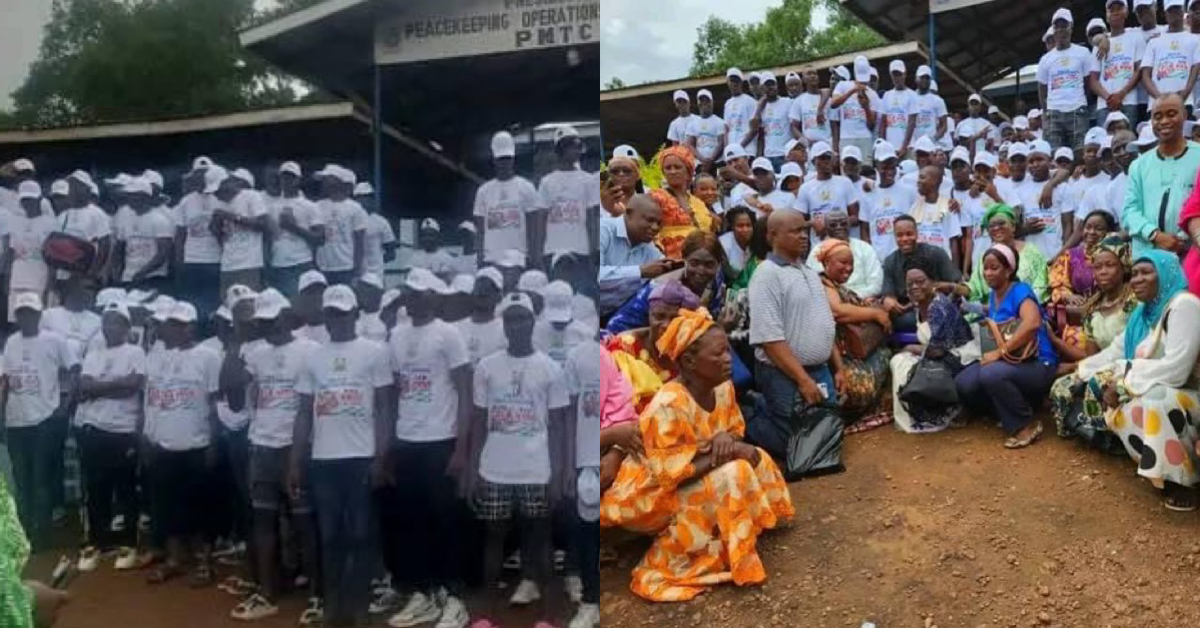On July 5, 2024, a significant milestone was reached at the Peace Mission Training Center (PMTC) in Hastings as the National Taskforce, led by the Ministry of Social Welfare and the Co-pillar Lead Ministry of Health, discharged the second batch of 115 rehabilitated service users.
These individuals, previously victims of the Kush drug epidemic, have undergone extensive rehabilitation and are now ready to reintegrate into society.
The discharge ceremony was a testament to the collective efforts of various government ministries and agencies. Deputy Executive Director of the National Public Health Agency, Mohamed Alex Vandi, applauded the unwavering dedication of the Ministry of Social Welfare under the leadership of Honorable Mrs. Melrose Karminty. He emphasized the importance of community involvement in the ongoing fight against Kush and encouraged parents to remain supportive and engaged with their children.
Representing the Ministry of Technical and Higher Education, Fatmata Kaiwa praised President Julius Maada Bio for his compassionate leadership. She announced the introduction of an E-Training program to help rehabilitated individuals acquire new skills and reintegrate into educational institutions.
The National Drug Law Enforcement Agency (NDLEA) has played a crucial role in supporting the rehabilitation process. Director of Drug Prevention Education and Training, Ibrahim Samuel Dugba, highlighted the importance of societal acceptance and the need to avoid stigmatization as these individuals reintegrate.
Retired Major General David Taluva, Minister of Internal Affairs, condemned the practice of sharing videos of individuals in distress on social media. He stressed the collective responsibility of society to support and guide young people, lauding the government’s commitment to providing a second chance for those affected by drug abuse.
Brigadier General A. S. Bockarie, Assistant Chief of Defense Staff Training and Doctrine, emphasized the transformative work done by the service providers. He encouraged the rehabilitated individuals to embrace the opportunities presented to them and contribute positively to nation-building.
Honorable Mrs. Melrose Karminty expressed her profound gratitude for the successful rehabilitation of the 115 service users. She highlighted the extensive therapeutic work undertaken by social workers, addiction professionals, and the RSLAF medical team at PMTC. These individuals, now community champions, are ready to join the 40 previously discharged service users in advocating against Kush in their communities.
The rehabilitation initiative was driven by President Bio’s commitment to human capital development. An inter-Ministerial Committee, formed in response to public concerns, implemented a multi-agency training program for professionals involved in the rehabilitation process. The project also included community awareness campaigns and public education efforts.
As part of the reintegration process, the rehabilitated service users have been allocated to various government ministries according to their career paths. Sixty will continue their education under the Ministry of Technical and Higher Education, twenty-six will join the Ministry of Basic and Senior Secondary Education, and thirty will be supported by the Ministry of Youth and the Ministry of Labour for skills acquisition and job placement.
Dr. David Moinina Sengeh, Chief Minister, emphasized the progress made in the rehabilitation program. He commended the government’s efforts and the service providers’ dedication, noting the significant positive change in the rehabilitated individuals. He assured the public that the government would continue to support the reintegration of these individuals into their respective careers, be it in education, entrepreneurship, or vocational training.
This successful rehabilitation and reintegration program is a beacon of hope for Sierra Leone, demonstrating the power of collaboration and commitment in addressing the challenges posed by drug abuse. The future is brighter for these individuals, who now stand as agents of positive change and nation-building.












Congratulation